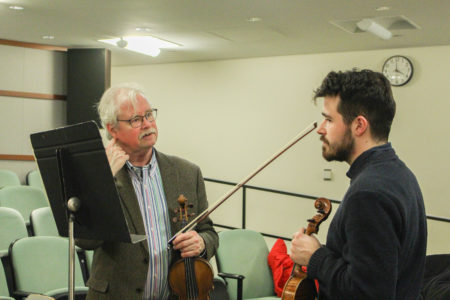By Mayo Sueta
suetamay@grinnell.edu
Andrew Jennings, professor of violin and chamber music at the School of Music, Theatre and Dance at the University of Michigan, came to campus on April 2 and 3 to perform violin and teach a master class on string instruments.
According to his profile on the University of Michigan website, Jennings “was a founding member of the Concord String Quartet,” a quartet that went on to receive three nominations for the Grammy Awards.
His visit to campus was funded by the Donald S. Noyce ’44 Master Class Project Endowed Fund, which was founded in the honor of Robert Noyce’s brother and Grinnell alumnus who started playing the cello at age 47. The fund was established “to offer annual master classes in a stringed instrument to provide Grinnell College students the opportunity to improve their musical skill,” according to the Grinnell College website.
For participant Joe Reck ’20, Jennings’s master class was enjoyable and made him look at music from a different point of view.
“I enjoyed it. It was good to have a new perspective on music. … It’s a real gift that we’re able to have that at Grinnell. He’s a good teacher and he really made me justify everything, every phrase musically,” Reck said. “He really emphasized the level of concentration and shaping a phrase really intentionally.”
Reck had the opportunity to work with Jennings for both his solo piece and his chamber group piece.
“I got to play solo repertoire for him for 30 minutes and then 45 minutes of work with my chamber group, so I got to work with him twice at two different settings,” Reck said.
Erin Kim ’21 also worked with Jennings both individually and as part of a group, and took away different lessons from each session.
“In the chamber music, he definitely focused on some ensemble stuff, keeping the tempo and staying together, being consistent the entire time, while with the solo you can be more free,” she said.
Kim felt that the master class challenged her outside of the technical aspects of playing music.
“He asked us to imagine a lot of things, so we could have an image in our mind in order to portray something. He asked me to think of something sad and … I’m not exactly very good at … imagining things to connect it to the music so that was kind of challenging,” she said. “He was extremely energetic and very enthusiastic and he definitely had an idea of what he wanted the music to sound like and he tried to use imagination to cue us to get the sound.”
She also noticed that some of Jennings’ suggestions about her piece differed from what her instructors at Grinnell had given, giving her a possible different interpretation for her piece.
“Some of the suggestions that he had were really different from what Professor [Nancy] Gaub, [music], offered. … Some notes he preferred separated, while Professor Gaub told us that she liked it more connected so … it was interesting to hear someone else’s opinion on the pieces because there’s just a million different ways you can play it,” Kim said. “Every musician has their own taste, I guess.”


















































